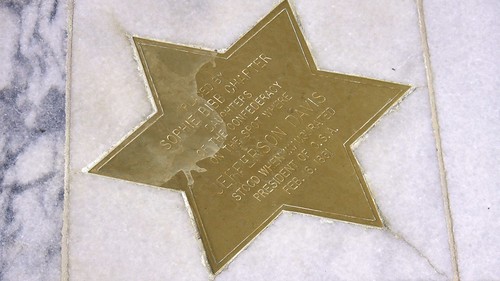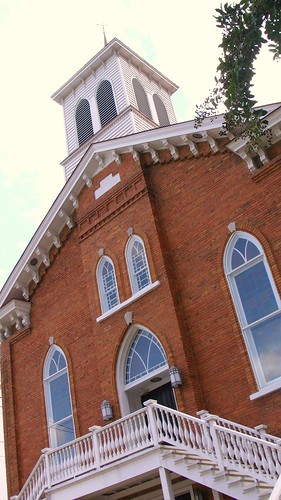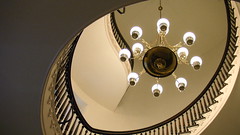The star is a queer memorial to the President of the Confederacy, queer because of its phrasing. The star is as much a memorial to the women of the south who placed it there, the Montgomery-based Sophie Bibb Chapter of the United Daughters of the Confederacy. This boosterism seems almost gratuitous.
The spot was venerated by the UDC as a holy shrine. In the opening of the minutes of their seventh annual meeting in 1900, held in the Montgomery Capitol, the UDC noted that, "all the Daughters' hearts were filled with emotion as they approached the first Capitol of the Confederacy, and with reverence they each stopped and viewed the gold star inlaid in the stone in the balcony by the Sophie Bibb Chapter in commemoration of the spot where President Jefferson Davis delivered his inaugural address."
 |
| Bible upon which Davis swore the Oath of Office / PD / AL Dept. of Archives |
The man read aloud to the women from 26th Matthew. He told the women of Christ, anointed by a woman with, "precious ointment," from, "an alabaster box." Upon seeing Jesus being lavished with fine oils, the disciples chastised their teacher, telling him that the, "ointment might have been sold for much, and given to the poor." The section of Matthew concluded with the trite query from Christ: "Why trouble ye the woman? for she hath wrought a good work upon me."
Whether the minister intended to strike a blow at criticism of Confederate Memorialization or not with his choice of reading from the Book of Matthew, the passage raises an interesting question. Why were these women pouring out hundreds of dollars, dollars which could be used on the poor, to memorialize a cause lost? Was the pastor's comparison of Jefferson Davis to Christ intended to be overt or was the reading's content a simple coincidence.
This past August, I found myself in Montgomery. I was driving back toward my hotel in Auburn from Selma. I had the opportunity to speak with interpretive staff on the Selma To Montgomery National Historic Trail as part of a project for work. These interpreters are both sharp and brave, staring down the tough stuff of history every day.
I was not going to drive through Montgomery without at least laying eyes on the Dexter Avenue Baptist Church. I knew it would be closed, I simply wanted to see the building itself. But as I began snapping a few photos, the first drops of rain began to hit my camera. A massive thunderstorm was rolling in from the west. Noticing a few tourists at the top of the stairs of the State Capitol opening the door and heading in, I had at least found a dry spot to wait out the torrent.
On my way up the steps I spotted the brass star sunk into the marble. I snapped a quick picture, and charged indoors out of the elements.
I am a New Yorker. I'm used to the Capitol at Albany, where visitors need to pass a gauntlet of metal detectors and security checkpoints to go even a few steps inside the door. As I opened the door to Alabama's Capitol, an elderly man stood up from his chair in the foyer's corner, handed me a map and told me the building closed in an hour. I was floored at how open the building was. I self toured the broad corridors for a time, waiting for the rain to subside.
When I returned to the door to the portico where Jefferson Davis took another fateful step toward war and attempting to tear a nation in twain, the elderly docent was peaking out the window at the rain, slowly abating.
"So Jeff Davis was inaugurated out on the steps?" I asked, making small talk with the man.
"Yup. Out there on that gold star is where OUR first and only President took the oath," the man replied proudly, with puffed chest.
I saw the pride in his eyes at Jefferson Davis' stand against the Federal Government. I saw the reverence with which he looked on that act. It was the same type of pride the UDC felt when they stepped across that threshold in 1900, after venerating that star. Their savior, Jefferson Davis, anointed with ointment and fine perfume. I couldn't resist.
"Where," I asked the aged Alabamian, "did Martin Luther King speak from?" I knew full well the answer.
The man scowled. "Down in the street," he snarled.
I struck out into the rain quickly. Meet the New South, I thought, same as the Old South.



No comments:
Post a Comment